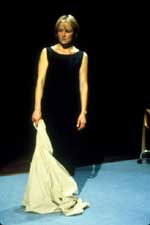
In The Real Thing, the clever tom stoppard tells a fairly simple story as trickily, as cleverly as possible. What, he wonders, is reality really? Playwrights since Pirandello, fictionists since Proust, have been pondering this question, lightly or ponderously. Stoppard, as also in The Real Inspector Hound, favors lightly. Here we get a rather Stoppardish playwright, Henry, married to the actress Charlotte. His good friend Max is the actor currently playing the autobiographical lead in Henry’s House of Cards opposite Charlotte. Max is married to the actress Annie, with whom Henry is conducting a clandestine affair and whom he will eventually marry. Then Annie will cheat on Henry although she truly loves him. All houses are houses of cards and end up collapsing. Some of them are rebuilt.
Part of the play is a play within a play (by Henry), but we are never alerted to which is which. An incident – Annie’s meeting on a train a Scottish soldier and anti-war protester who is later jailed for defacing a monument – is told three ways: as Annie related it to Henry, as Henry wrote it in a TV play, and as it really happened. Don’t hastily assume that the third version is the truth. Is history’s Richard III more real than Shakespeare’s? And how true to the living man was history? (The play hasn’t asked these particular questions, but it might just as well have.)
Stoppard has lots of fun with his assorted adulteries, and his dialogue suitably sparkles. Henry loves pop music, though the women try to introduce him to better things. Taken to an opera to hear “real music,” he finds the Walker Brothers’ recording of “Sun Ain’t Gonna Shine Anymore” much more moving than “that female vocalist person,” as he describes Callas to Max, and asks, “Do you think there’s something wrong with me?” “Yes. I’d say you were a moron.” Too bad that Stoppard, whose autobiographical hero flaunts his perfect grammar in this very play, is so fallible (note that were). Still, we’d rather have him with all his deviousness and deviations than not at all.
The current revival is less pleasurable than the 1984 American premiere, which had the proper sets and was better directed. Stephen Dillane is palpably talented, but his Henry is a little less smooth and sophisticated than called for, though no less amusing. Sarah Woodward is a strangely frumpish Charlotte, and Nigel Lindsay an unaccountably lower-class Max. Jennifer Ehle has the right stuff for Annie, but also an odd way of standing around, for which I blame the director, David Leveaux. Particularly awkward is a sudden collapse of Dillane’s, undercut by his facing upstage. The three supporting players do fairly by their ancillary roles.
Most peculiar are Vicki Mortimer’s sets, a cross between structuralism and minimalism, seemingly trying to re-create the Donmar Warehouse, where this production originated. The actors’ often oversubdued diction may also be geared to a more intimate venue. Still, Stoppard is one of our few brainy and literate dramatists (even if he writes “the woman whom Charlotte has ceased to be”) and once again warms up Broadway’s intellectual climate by several balmy degrees.